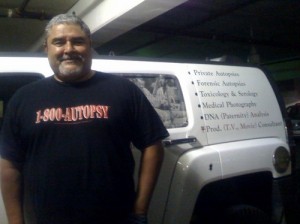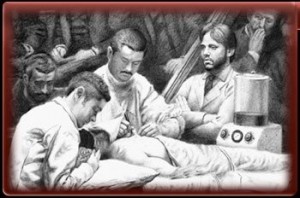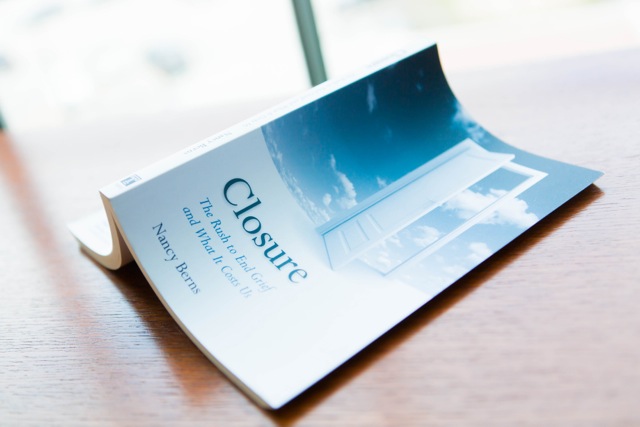Vidal Herrera travels around in a white minivan with 1-800-Autopsy painted on the side.  Inside the van is everything he needs to perform an autopsy.
Inside the van is everything he needs to perform an autopsy.
Herrera says the autopsy business is growing and recession-proof. He operates three franchises in Florida, California and Nevada. Herrera claims, “People that are hurting need to find closure, pursue litigation or even get a second opinion.”
Selling closure is a nicer, more comfortable idea than other services or products that are actually being sold. An autopsy is a perfect example of this strategy. Think about it. How do you sell an autopsy? It is not likely that you will see a commercial for an autopsy during your favorite television show although the role of autopsies in many hospital and crime shows may implicitly sell the idea. One answer is closure.
Journalists have helped set the stage for this idea in celebrity deaths. Someone dies and we wait for the autopsy report. When it comes, media stories announce that we can now find closure.
For family members who do not have many questions about why someone died, some autopsy providers try to create concern. One strategy is to raise doubts about the quality of medical care received by the deceased. Pathology Support Services tap into the need for more information and the distrust of hospitals or care centers. Their website states, “there are approximately 40% serious errors in the diagnosis of hospitalized patients who die and are autopsied and two thirds of the undiagnosed conditions were considered treatable.”
Another strategy to raise the need for closure is to suggest that survivors might experience guilt about whether they provided adequate care or harbor lingering questions about why the person died. Some autopsy providers suggest that enhancing a family medical history through knowledge generated by an autopsy can provide closure.
Autopsy providers market their services to wrongful death attorneys who in turn encourage clients to order an autopsy in order to find information for lawsuits. Furthermore, autopsy providers market to insurance companies in order to help them gather information, which could help them avoid payouts. Sometimes life insurance policies vary depending on the cause of death. Of course, the same providers may market their services to family members arguing that they might find information to help them receive higher insurance benefits.
 The services are not free. Toxicology reports (blood and urine tests for drugs) start at approximately $400. Partial and complete autopsies range from $1500 to $6000. In many cases, insurance will not cover an autopsy that is performed by a private provider. The bill can be high—so the need for closure needs to be higher. Closure and peace of mind are packaged together to sell you these services.
The services are not free. Toxicology reports (blood and urine tests for drugs) start at approximately $400. Partial and complete autopsies range from $1500 to $6000. In many cases, insurance will not cover an autopsy that is performed by a private provider. The bill can be high—so the need for closure needs to be higher. Closure and peace of mind are packaged together to sell you these services.
There are times when people benefit from services and products that provide knowledge. For example, I do not disagree that there are cases when an autopsy is important. Countless families have received critical information from an autopsy or private investigation. They may or may not describe it as closure, but in any case, many report being helped by these services. It is important that we have private autopsy providers who are professionally trained and properly regulated in order to give us more information about death when we need it. But this can be offered without promising closure and exploiting the emotions of grieving family members.
Clearly, there are questions that haunt us. Doing what we can to answer many of those questions is important. But we also need to learn that answers do not necessarily mean “closure.”
We can survive a loss even when there are some questions that remain. We can find some peace (even if not complete) and find healing (even if pain lingers, which it does), without having all the answers. We will not always have answers. And even the answers we receive may carry lingering doubt. The trick may not be finding all the answers, but learning to live with some questions. It is also important to monitor those who are claiming to sell answers.
For Herrara, the autopsy services are part of a larger business. He runs Morgue Prop Rentals, which rents out autopsy-morgue equipment for film producers. Herrera also owns Coffin Couches where, as it sounds, he recycles coffins into couches and sells them for around $4,000. Or for $25, you can just order a 1-800-AUTOPSY T-shirt.

I do not buy closure. It seems to be something that somebody made up and a bunch of people believe in it. I have never understood it in any context that it has been used. I think it is just snake oil sold to people by a bunch of low life college boy opportunists who are just trying to pump up their already overinflated egos. I can see that the king ain’t wearing any clothes.
You would enjoy (and agree with) my book. Check it out!